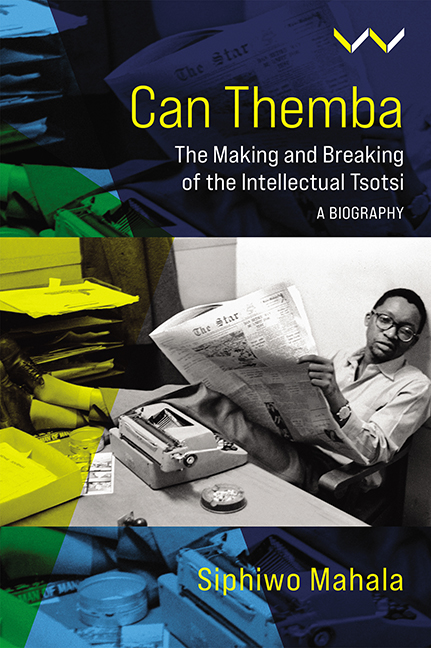Book contents
- Frontmatter
- Dedication
- Epigraph
- Contents
- List of Illustrations
- Acknowledgements
- Introduction
- PART I Death and Birth of a Scribe
- PART II ‘Live Fast and Die Young’
- PART III The ‘Intellectual Tsotsi’
- PART IV Dances with Texts: Writing and Storytelling
- PART V A Writer’s Immortality
- Postscript: The Three Burials of Can Themba
- Notes
- Bibliography
- Index
5 - The Drum Seduction
Published online by Cambridge University Press: 26 May 2022
- Frontmatter
- Dedication
- Epigraph
- Contents
- List of Illustrations
- Acknowledgements
- Introduction
- PART I Death and Birth of a Scribe
- PART II ‘Live Fast and Die Young’
- PART III The ‘Intellectual Tsotsi’
- PART IV Dances with Texts: Writing and Storytelling
- PART V A Writer’s Immortality
- Postscript: The Three Burials of Can Themba
- Notes
- Bibliography
- Index
Summary
There has been no one I have admired more, in a lifetime of mixing with the great and the little, than Canodoce Dorsay von Themba, and no one I’ve hoped more to be fulfilled. A man of great reading, a working philosopher, a witty and wise companion, a gifted editor and writer.
Sylvester Stein — Who Killed Mr Drum? (2003 [1999]), 95Can Themba had a certain presence that made even the authorities afford him respect. He was a towering figure, not only physically, but also intellectually, with a magnanimous personality and a confident demeanour. Witty, articulate and erudite, he could hold up a discussion on any topic, and it was this aura that he brought to the Drum newsroom.
The African Drum, as Drum magazine was initially called, was founded in 1951 as a quarterly by former cricketer Robert ‘Bob’ Crisp, with Jim Bailey, the son of a mining magnate, coming on board as a financier. Although the black urban population was its target market, Henry Nxumalo was the only African journalist in the initial team of reporters at Drum magazine. He had been a messenger for the Bantu World newspaper, had worked for the Post and had read extensively while serving on the side of the Allies in Egypt and during trips to London (where he met with other displaced South African intellectuals) during the Second World War. He was nevertheless considered suitable only for the position of sports editor, probably because only he could go into the townships to watch soccer and boxing matches and report on them.
The evolution of Drum magazine during its first decade reflects a complex and fast-changing world. Drum was established to appealto the cultural nostalgia of the black urban population, whose rapid increase in the Transvaal region could not be ignored.
After the discovery of gold in the 1880s on the Rand (or ‘Reef’, a geological formation that was to establish Johannesburg as a city), movement to and urbanisation in the area exploded. At the time, the Transvaal was a ‘Boer Republic’; in other words, it had been colonised by the descendants of Dutch immigrants who had spread northwards. Its mineral wealth led to the British fighting two wars (formerly known as the Anglo-Boer Wars, now more correctly termed the South African Wars) to seize the Boer regions in order to serve the economic interests of the British Empire.
- Type
- Chapter
- Information
- Can ThembaThe Making and Breaking of the Intellectual Tsotsi, a Biography, pp. 51 - 55Publisher: Wits University PressPrint publication year: 2022



